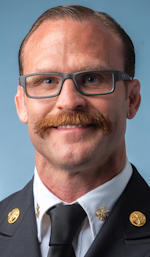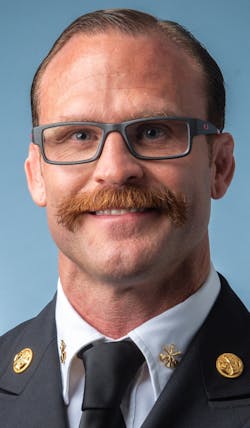As I’ve progressed in my life both personally and professionally, I’ve learned the power that attitude has. I’m intentional when I use the word “power” in this context, because one definition of power is “the capacity or ability to direct or influence the behavior of others or the course of events.” This is one of the main responsibilities of leaders: to influence the behavior of others.
So, my question to you is this: Are you influencing your teammates’ behavior in a positive or negative way?
We must remember that, as leaders, “your vibe attracts your tribe,” and this directly relates to the energy and attitude that a leader has day in and day out. Yes, we all have bad days; however, when bad days turn into a pattern of behavior, it directly affects productivity, job satisfaction, purpose and, definitely, morale.
Leaders care, period
You see, organizations are built as one large team, with smaller factions (teams) that encompass the whole. This is where we sometimes forget as leaders that we directly affect those who are around us positively or negatively, which then affects other factions positively or negatively. Whether your direct reports number 100 or a handful, the energy and attitude that you bring to them replicate through that smaller faction in an organization. The hope is that if enough of the smaller factions (teams) buy into and get directly involved in positively progressing an organization, the influence factor increases exponentially. This is critical in organizational development. I mean, who wants to work with someone who is in a bad mood all of the time or just inherently is negative? The answer, of course, is no one.
It’s unfortunate that people suffer from this, but I know about it, because I was once that way myself. However, as I watched real leaders work their magic, I was impressed with the way that they could sway the energy in the room with their positivity, demeanor, candor, vulnerability, ownership and caring personality. I always have gravitated toward that but didn’t know how to exhibit it until I really homed in on the specifics and worked on my confidence level in those situations. It takes time, practice and continual learning.
Remember, leaders aren’t special people. Leaders are those who have a care and love like no other of what they are charged with leading. There are people in leadership positions who don’t operate that way, and they aren’t leaders. They are in a position that has a title, but they won’t influence enough of the right people to make a difference. Unfortunately, though, they can influence enough people negatively to cause issues, which then must be addressed. I see it in organizations all over the world when I try to improve their employees’ behavior. The constant concern I hear is that “our firefighting skills are great, but our personal skills are lacking.” We must realize that 1 percent–2 percent of the time we fight fire. What are we doing the other 98 percent–99 percent of the time? We use personal skills and display our attitude, energy, the way that we communicate and other important skills that we don’t focus on enough.
Find balance
No matter your position, do you want to be someone who no one wants to work with or someone who people gravitate toward for positivity and encouragement? For me, I want to be someone who others can be proud of as their teammate. That’s difficult, because I know that there are people who don’t like me as a leader or a person for whatever reason. I can’t control that. I can control how I let that affect my positive attitude, energy and love for my organization.
I always will help those who don’t care for me as much as those who do, because that’s the calling of a leader. I lead them with love just like those who are in my immediate circle. However, what people who never actually led anything in their life don’t understand is how much leading affects you overall.
Leaders have feelings, too. We are hard on ourselves and beat ourselves up over decisions, conversations, interaction, etc.
What I’m getting at is that it hurts to be a leader at times. All you want is the best for your teammates. You want them to succeed. You want them to love the organization as much as you do. You want them to take pride in the patch as you do, because it means something to wear it. Unfortunately, the reality is that not everyone will.
As the leader, you must find balance in this emotionally, so it doesn’t affect the work that you can do and, no matter what, the positive attitude and energy that you can bring each day.
Over time, I learned to not get myself worked up over items that I can’t control. When I was a captain, I ensured that we had a positive work environment in the station that fostered belonging, creativity and building a powerful team. I knew that I had very little control over certain things, so I didn’t waste my time worrying or complaining about them. I used that time to train and build a team that was close-knit and highly effective on scene and in public. As a battalion chief and shift commander, I intentionally communicated with love to all of my teammates but also exhibited that positive attitude and energy.
Now, don’t mistake this for bouncing off the walls and excited all of the time. What I’m referring to is the way that it’s exhibited no matter what your job function is. If you’re a new firefighter, clean that toilet, make the coffee, and train with a positive attitude and energy, because you are blessed to be a new firefighter. If you’re a driver, check that rig off with the love of protecting your crew. If you’re a captain, take stock in the development of your crew and encourage those people to get an education, train hard and improve their soft skills. As a battalion chief, work with your battalion members to build an environment that allows them to express concerns in a positive way. As an assistant chief, deputy chief or fire chief, bring positive attitude and energy wherever you go, because all of your teammates are watching and so is the public.
The final point
The power of your attitude and energy can be positive or negative. We often forget that we control this 100 percent with the way that we carry ourselves, the way that we speak to one another, the way that we treat our teammates and the level of care that we have for others.
You don’t need a fancy education or 30 years on the job for this. You just need to be human and to care about others. It goes back to the golden rule: Treat others as you would want to be treated.
If you actually believe in what brotherhood and sisterhood in emergency services really means, start improving your personal skills to include having a positive attitude and the energy that’s needed to influence others in a productive way. That’s what takes organizations to the next level. You and I control that, and that’s called power. Use that power to help others, instead of to bring them down.

Dr. David Griffin
Dr. David Griffin is the assistant chief of administration in Charleston, SC. He was the operator of the first-due engine on June 18, 2007, when nine of his fellow firefighters perished. Griffin has come through the ranks in operations in every uniformed position, from firefighter to battalion chief and shift commander to his current position, during his 19-year career in Charleston. He has a bachelor's degree in education from The Citadel, a master's degree in executive fire service leadership, and a doctorate of education in organizational leadership and development. Griffin is the author of "In Honor of The Charleston 9: A Study of Change Following Tragedy," among three other books. He is an international speaker and instructor, a certified Chief Fire Officer and Chief Training Officer with The Center for Public Safety Excellence, an IFSAC/Pro Board-certified Fire Officer IV and a graduate of the Executive Fire Officer Program from the National Fire Academy. He is a graduate of Harvard University's Kennedy School of Executive Education program: Senior Executives in State and Local Government and of the Psychology of Leadership program at Cornell University's SC Johnson College of Business. Griffin is the owner of On A Mission, LLC, at drdavidgriffin.com.






